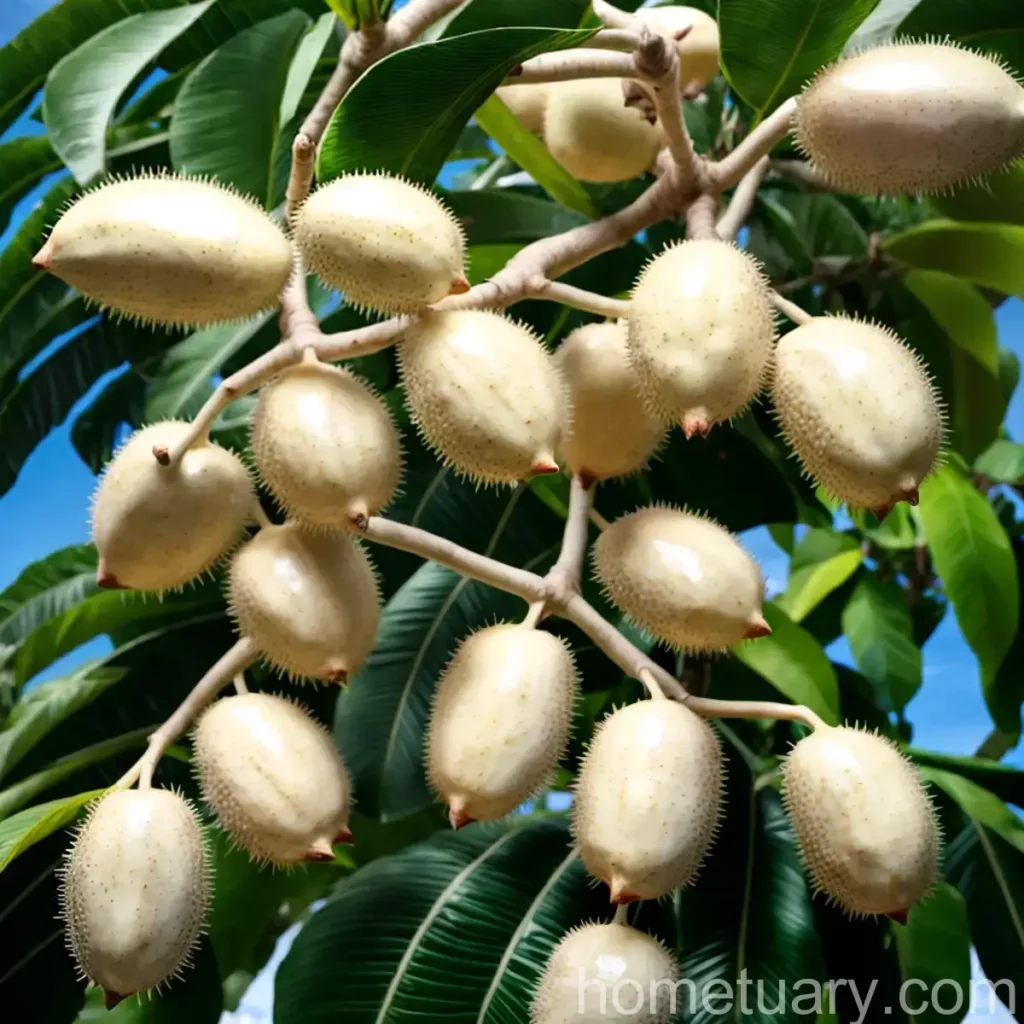Soursop (Annona muricata): The Exotic Fruit with Incredible Health Benefits
Soursop, scientifically known as Annona muricata, is a tropical fruit renowned for its unique flavor and incredible health benefits. This plant belongs to the Annonaceae family and is native to the tropical regions of the Americas. In this comprehensive guide, we will delve into the various aspects of soursop, from its cultural requirements to its medicinal uses and benefits. We will explore the plant’s adaptation, cultivation, common diseases, and how to care for it, alongside fascinating fun facts and valuable resources. Join me as we unravel the beauty and importance of the soursop plant.
What is Soursop (Annona muricata)?
Soursop, also known as graviola, guanabana, or Brazilian paw paw, is a small, evergreen tree that bears a fruit of the same name. The soursop fruit has a green, spiky exterior with soft, white flesh inside that boasts a delightful combination of flavors resembling a mix of strawberry and pineapple with a subtle hint of citrus. It is widely consumed as a food and used in traditional medicine due to its numerous health benefits. While the flesh of the fruit is the most commonly consumed part, almost all parts of the soursop plant including the leaves, seeds, and bark are known for their various medicinal properties.
Key Takeaways – Soursop (Annona muricata)
Before we embark on a deep dive into the world of soursop, let’s briefly touch upon the key takeaways that we will explore in detail:
- Soursop health benefits: Unravel the incredible health benefits associated with soursop fruit and other parts of the plant.
- Annona muricata plant: Understand the botanical characteristics and growth habits of the soursop tree.
- Soursop fruit uses: Explore the diverse uses of soursop fruit in culinary and medicinal domains.
- Soursop plant properties: Delve into the unique properties and characteristics of the soursop plant.
- Soursop tree information: Learn about the growth patterns, size, and tree structures of the soursop plant.
- Annona muricata benefits: Explores the numerous health benefits and traditional uses attributed to the soursop plant.
- Medicinal uses of soursop: Understand the various medicinal applications of soursop in traditional and modern medicine.
- Soursop cancer-fighting properties: Uncover the potential role of soursop in combating cancer and its properties as an anti-cancer agent.
- Soursop nutrition facts: Explore the nutritional composition and value of soursop fruit and plant parts.
- Soursop herbal remedies: Gain insights into the traditional and herbal remedies derived from soursop plant.
- Annona muricata cultivation: Understand the specific cultural requirements and practices for cultivating soursop.
- Soursop leaf benefits: Learn about the health benefits associated with soursop leaves and their uses.
- Soursop tea recipe: Discover how to prepare a refreshing and healthy soursop tea.
- Annona muricata research: Explore the current scientific research and studies related to soursop and its medicinal properties.
- Soursop traditional medicine: Uncover the traditional and cultural significance of soursop in indigenous medicine.
- Soursop plant care: Get valuable insights into the best practices for caring for soursop plants.
- Soursop leaves health benefits: Delve into the various health benefits attributed to soursop leaves.
- Annona muricata extract: Understand the process of extracting beneficial compounds from soursop plant parts.
- Soursop juice benefits: Explore the potential health benefits of consuming soursop juice.
- Soursop skin health: Learn about the skin health benefits associated with soursop consumption and applications.
- Annona muricata traditional uses: Uncover the traditional and cultural uses of soursop in different societies.
- Soursop for diabetes: Explore the potential role of soursop in managing diabetes and its effects on blood sugar levels.
- Soursop for weight loss: Understand how soursop consumption may contribute to weight management and loss.
- Annona muricata anti-inflammatory properties: Explore the anti-inflammatory properties of soursop and its potential applications.
- Soursop for immune health: Gain insights into the immune-boosting properties of soursop consumption.
- Soursop natural remedies: Uncover the natural remedies derived from soursop for various health conditions.
- Annona muricata fruit properties: Understand the properties and characteristics of the soursop fruit.
- Soursop culinary uses: Explore the diverse culinary uses of soursop in various cuisines.
- Soursop seeds benefits: Learn about the potential health benefits associated with soursop seeds.
- Annona muricata herbal uses: Gain insights into the traditional and herbal applications of soursop plant parts.
- Soursop for anxiety relief: Explore the potential calming and anxiety-relieving effects of soursop consumption.
- Soursop for digestive health: Understand how soursop consumption may promote digestive health and well-being.
- Annona muricata cancer treatment: Delve into the potential role of soursop in cancer treatment and management.
- Soursop for skin care: Learn about the skincare benefits attributed to soursop and its applications in skincare.
- Soursop plant adaptations: Explore the unique adaptations of soursop plants to their natural environment.
- Annona muricata antimicrobial properties: Understand the antimicrobial properties of soursop and its potential applications.
- Soursop aphrodisiac effects: Uncover the traditional beliefs and cultural significance of soursop as an aphrodisiac.
- Soursop for heart health: Explore the potential cardiovascular health benefits associated with soursop consumption.
- Annona muricata tea benefits: Learn about the potential health benefits of consuming soursop tea.
- Soursop for respiratory health: Understand the potential role of soursop in promoting respiratory health and well-being.
- Soursop plant folklore: Discover the folklore and cultural stories associated with the soursop plant.
- Annona muricata traditional recipes: Explore traditional recipes and culinary uses of soursop in different cultures.
- Soursop leaf extract: Understand the process of extracting beneficial compounds from soursop leaves.
- Soursop for pain relief: Explore the potential pain-relieving properties of soursop and its applications in pain management.
- Annona muricata anti-aging properties: Delve into the anti-aging properties attributed to soursop consumption and applications.
- Soursop for liver health: Understand the potential benefits of soursop in promoting liver health and function.
- Soursop plant symbolism: Uncover the symbolic and cultural significance of soursop in different traditions.
- Annona muricata in ayurveda: Gain insights into the role of soursop in Ayurvedic medicine and its traditional use.
- Soursop for hair growth: Explore the potential effects of soursop consumption on hair health and growth.
- Soursop plant history: Delve into the historical significance and cultural history of soursop as a plant.
With these key takeaways in mind, let’s unravel the fascinating world of soursop in detail.
Culture
Uses
The soursop plant, specifically its fruit and other parts, serves a multitude of purposes, ranging from culinary applications to medicinal uses:
– Culinary Uses: The soursop fruit is a popular ingredient in juices, smoothies, ice creams, and desserts due to its unique flavor profile. It can be consumed fresh or used to prepare jams and jellies.
– Medicinal Uses: Various parts of the soursop plant, including the leaves, seeds, and bark, are used in traditional medicine for their purported health benefits such as immune-boosting, anti-inflammatory, and anticancer properties.
Water
Soursop plants thrive in moist soil and require regular watering, especially during the growing season. Adequate water supply is crucial for the development of healthy fruits and foliage.
Sunlight
Soursop plants prefer full sun or partial shade, making them well-suited for tropical and subtropical regions with ample sunlight.
Fertilizer
A balanced and organic fertilizer can support the growth and fruiting of soursop plants. High-quality compost or a slow-release fertilizer can provide the necessary nutrients for healthy plant development.
Soil
Soursop plants prefer well-draining, fertile soil with a slightly acidic to neutral pH. Sandy loam or loamy soil types are well-suited for soursop cultivation.
Pruning
Pruning soursop plants can help maintain their shape, promote airflow, and encourage fruit production. It is advisable to remove any dead or diseased branches and to prune for a desirable tree structure.
Propagation
Soursop plants can be propagated through seeds or vegetative methods such as cuttings or air layering. Seed propagation is commonly practiced, but it may take several years for the seedlings to bear fruit.
Container Popularity
Soursop plants are also suitable for container or pot cultivation, making them accessible to gardening enthusiasts with limited outdoor space.
Container
When cultivating soursop in containers, ensure that the pots have sufficient drainage holes and provide adequate space for root development. Regular watering and fertilization are essential for container-grown soursop plants.
Common Diseases
Soursop plants are susceptible to certain diseases, including:
- Anthracnose: A fungal disease that causes dark lesions on leaves and fruits.
- Powdery Mildew: A common fungal infection characterized by a powdery white growth on the leaves.
- Phytophthora Root Rot: A soil-borne disease that can lead to root rot and wilt in soursop plants.
Disease Diagnosis
Closely monitor the soursop plants for any signs of disease, such as leaf discoloration, wilting, or unusual growths. Prompt diagnosis and appropriate treatment measures can help manage and prevent the spread of diseases.
Common Pests
Soursop plants may attract certain pests such as:
– Fruit Flies: These pests may infest soursop fruits, leading to damage and spoilage.
– Scale Insects: Scale infestations can affect the leaves and stems of soursop plants, impacting their overall health.
Botanist’s Tips
- Climate Considerations: Select soursop varieties that are well-suited to the climatic conditions of your region for optimal growth and fruit production.
- Regular Maintenance: Conduct regular inspections and maintenance practices to ensure the health and vigor of soursop plants.
- Pruning Techniques: Employ proper pruning techniques to promote fruiting and maintain the overall health of the soursop tree.
- Soil Quality: Pay attention to soil quality and composition, as it significantly influences the growth and productivity of soursop plants.
Fun Facts
- The soursop fruit is rich in vitamins, minerals, and dietary fiber, making it a nutritious addition to the diet.
- Soursop leaves are often used to prepare herbal teas and infusions, valued for their potential health-promoting properties.
As we continue our exploration of soursop, let’s delve into the incredible health benefits associated with this tropical fruit and its various plant parts.
Health Benefits of Soursop (Annona muricata)
The soursop plant, particularly its fruit, leaves, and seeds, is renowned for its diverse health benefits and medicinal properties. Let’s unravel the remarkable health-promoting potential of soursop:
Soursop Health Benefits
Nutritional Value
Soursop fruit is a rich source of vital nutrients including vitamin C, vitamin B6, and dietary fiber. It also contains minerals such as potassium, magnesium, and iron, contributing to overall health and well-being.
Antioxidant Properties
The presence of natural antioxidants in soursop, including flavonoids and phenolic compounds, may help combat oxidative stress and reduce the risk of chronic diseases.
Immune-Boosting Effects
Consumption of soursop fruit and beverages made from soursop leaves may contribute to enhanced immune function, potentially aiding in the body’s defense against infections and illnesses.
Anti-Inflammatory Potential
Certain compounds present in soursop exhibit anti-inflammatory properties, which may be beneficial for individuals dealing with inflammatory conditions and discomfort.
Anti-Cancer Properties
Soursop has gained attention for its potential anticancer properties, with some studies suggesting that certain compounds in soursop may inhibit the growth of cancerous cells.
Digestive Health Support
The dietary fiber and natural enzymes found in soursop may aid in promoting healthy digestion and alleviating digestive issues such as constipation and bloating.
Skin Care Benefits
Topical applications of soursop extracts are believed to offer skin-soothing and nourishing effects, contributing to overall skin health and radiance.
Heart Health Promotion
The potassium content in soursop fruit may support cardiovascular health by helping regulate blood pressure and promoting proper heart function.
Annona muricata Benefits
Traditional Medicine
Soursop has been utilized in traditional medicine systems for centuries, with various cultures attributing it with properties that support overall health and vitality.
Herbal Remedies
Different parts of the soursop plant, including the leaves and seeds, are used in herbal preparations for their potential therapeutic value in managing various health conditions.
Antimicrobial Activity
Certain compounds in soursop are believed to possess antimicrobial properties, which may help combat harmful microorganisms and promote overall well-being.
As we’ve uncovered the extensive health benefits of soursop, let’s transition to exploring the cultivation and care requirements for soursop plants.
Cultivation and Care
Annona muricata Cultivation
Climate Requirements
Soursop plants thrive in warm, tropical climates with high humidity and ample sunshine. They are sensitive to frost and colder temperatures, requiring protection in cooler regions.
Soil Conditions
Well-draining, fertile soil is ideal for soursop cultivation. It is essential to avoid waterlogged or compacted soil to prevent root rot and other issues.
Watering Regimen
Young soursop plants require consistent moisture, and regular irrigation is essential during dry periods. Mature plants are relatively drought-tolerant but benefit from adequate watering.
Pruning and Training
Pruning can help manage the size and shape of soursop trees, promote airflow, and facilitate fruit production. Training young plants to a desired structure early on can ease future maintenance.
Soursop Plant Properties
Growth Habits
Soursop plants are evergreen trees with a compact, bushy growth habit. They can reach heights of 8-10 meters and produce large, fragrant flowers.
Fruit Development
The soursop fruit typically takes 2-3 months to mature after flowering. It has a spiky green exterior and soft, white, fibrous flesh containing the seeds.
Now that we’ve gained insights into the cultural and cultivation aspects of soursop, including its health benefits and properties, let’s turn our attention to the diagnosis and management of common diseases and pests affecting soursop plants.
Disease Management
Common Diseases
Anthracnose
Anthracnose is a fungal disease that causes dark, sunken lesions on soursop fruits, leading to fruit rot and spoilage. It can also affect the leaves, causing irregular brown spots and defoliation.
Powdery Mildew
Powdery mildew presents as a white, powdery growth on the leaves and young shoots of soursop plants. It can hinder photosynthesis and weaken the overall health of the plant.
Phytophthora Root Rot
This soil-borne disease affects the roots of soursop plants, leading to wilting, stunted growth, and eventual death of the plant if left untreated.
Disease Diagnosis
Regularly inspect the soursop plants for any signs of disease, including unusual spots on leaves, fruit lesions, or atypical growth patterns. Prompt identification is crucial for timely intervention.
Pest Management
Fruit Flies
Fruit fly infestations can cause damage to soursop fruits, leading to premature ripening and spoilage. Traps and barriers can be employed to manage fruit fly populations.
Scale Insects
Scale insects can weaken soursop plants by feeding on the sap and excreting honeydew, which promotes the growth of sooty mold. Natural predators and horticultural oils can help control scale infestations.
Botanist’s Tips:
- Integrated Pest Management: Employ a comprehensive approach to pest management, integrating cultural, biological, and chemical control methods as needed.
- Early Intervention: Address any signs of pest infestations promptly to prevent widespread damage and maintain the health of soursop plants.
With these insights into disease and pest management, let’s round off our exploration of soursop with an array of valuable resources and fascinating external links for further information.
Valuable Resources and External Links
Explore the incredible world of soursop, ranging from cultivation tips to medicinal uses and health benefits, with the following resources and links:
- World Health News – Soursop Health Benefits: Delve into the extensive health benefits of soursop, backed by scientific research and studies.
- Tropical Fruit Growers Association: A comprehensive resource for soursop cultivation practices, pest management, and fruit production.
- International Journal of Medicinal Plants Research – Annona muricata: Access the latest research and findings related to the medicinal and therapeutic properties of soursop.
- Healthy Living Magazine – Soursop Recipes and Remedies: Discover a myriad of recipes and herbal remedies featuring soursop and its various plant parts.
- Botanical Garden Database – Annona muricata Cultivation Guide: Gain access to in-depth cultivation guidance and care tips for soursop plants in diverse environments.
Conclusion
Soursop, the exotic tropical fruit with remarkable health benefits, encompasses a world of culinary, medicinal, and cultural significance. From its traditional uses in herbal remedies to its potential roles in disease management and health promotion, soursop stands as a testament to the diversity and vitality of our natural world. As we continue to explore and appreciate the wonders of soursop, let’s embrace its rich heritage and potential contributions to holistic well-being and sustainable living.
In conclusion, let’s celebrate the soursop plant for its resilience, versatility, and the myriad gifts it offers to humanity and our interconnected ecosystems. Whether enjoyed as a delectable fruit, brewed as a nourishing tea, or utilized in traditional remedies, soursop truly embodies the age-old adage of “food as medicine,” inviting us to tread the path of wellness in harmony with nature.
As you embark on your journey with soursop, may your discoveries be filled with wonder and enlightenment, and may the lush greenery and bountiful fruits of the soursop plant continue to inspire















